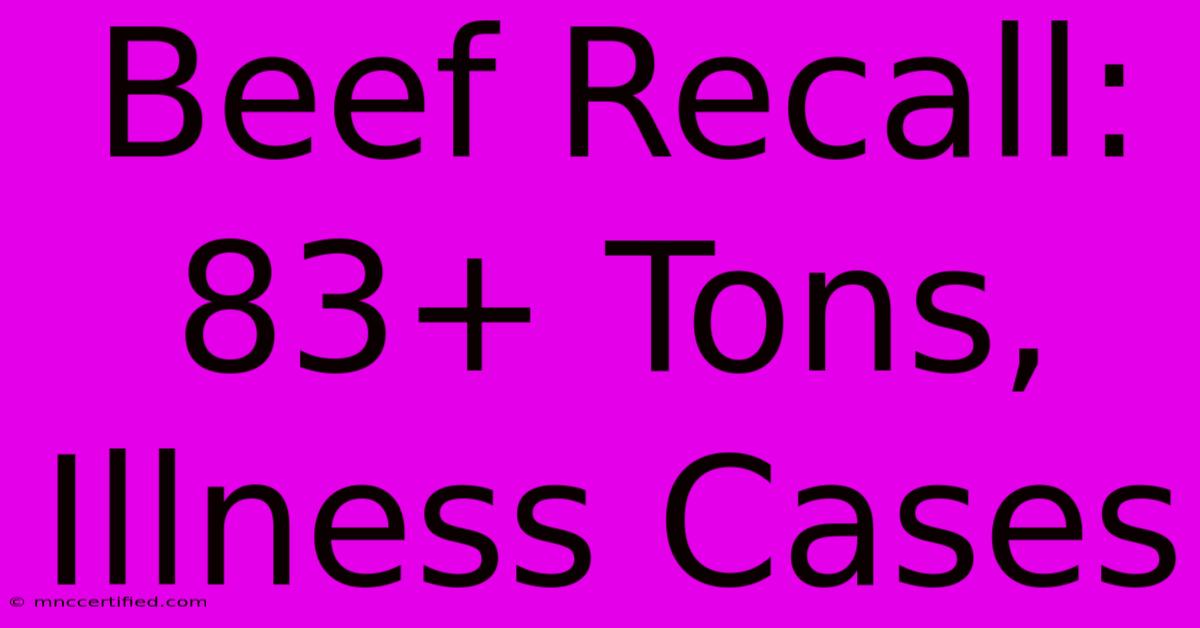Beef Recall: 83+ Tons, Illness Cases

Table of Contents
Beef Recall: 83+ Tons of Meat Recalled Due to Illness Concerns
A major beef recall impacting over 83 tons of product has been issued, sparking concerns about potential illness among consumers. This article delves into the details of the recall, the reasons behind it, and what consumers should do if they have purchased the affected products. We'll also explore the broader implications of large-scale meat recalls and steps taken to prevent future incidents.
Understanding the Scope of the Recall
The recall, announced by [Insert relevant authority, e.g., USDA's Food Safety and Inspection Service (FSIS)], involves a significant quantity of beef, exceeding 83 tons. This substantial volume underscores the seriousness of the situation and the potential reach of the contamination. The affected products were distributed across [Insert states or regions affected]. Consumers are urged to check their freezers and refrigerators immediately.
Products Affected: Identifying the Recalled Beef
Precise details regarding the specific brands, product codes, and packaging information are crucial. [Insert detailed list of affected products including brand names, package sizes, establishment numbers (if applicable), and best-by or sell-by dates]. Checking the packaging carefully is paramount. If you find any of the listed products, do not consume them.
Reasons Behind the Recall: Tracing the Source of Contamination
[Explain the reason for the recall - e.g., E. coli contamination, Salmonella contamination, or other potential health hazards]. Investigations are underway to pinpoint the source of the contamination within the production process. This may involve tracing the beef back to the origin, examining processing facilities, and implementing stringent testing procedures. The [Insert relevant authority] is working diligently to identify the root cause and prevent similar incidents in the future.
What to Do If You Have Purchased Recalled Beef
Consumers who have purchased the affected products should take immediate action. Do not consume the recalled beef. Instead, follow these steps:
- Discard the product: Safely dispose of the recalled beef in a sealed bag to prevent cross-contamination.
- Contact the retailer: If you purchased the beef from a store, inform them about the recall and request a refund or replacement. Retain your receipt as proof of purchase.
- Monitor your health: Pay close attention to your health and seek medical attention if you experience any symptoms of foodborne illness, such as nausea, vomiting, diarrhea, or fever.
- Report any illness: If you believe you have fallen ill after consuming the recalled beef, report it to your doctor and, potentially, the relevant health authorities.
Preventing Future Recalls: Ensuring Food Safety
Large-scale meat recalls highlight the importance of robust food safety measures throughout the production and distribution chain. This includes:
- Improved sanitation practices: Stringent hygiene protocols within processing plants are crucial to minimize the risk of contamination.
- Enhanced testing procedures: Regular and thorough testing of beef products at various stages of production can help detect potential hazards early.
- Stronger traceability systems: Effective tracking mechanisms allow for quick identification and removal of contaminated products from the market.
- Increased consumer awareness: Educating consumers about proper food handling and storage practices is essential.
Conclusion: Staying Informed and Safe
The recall of over 83 tons of beef underscores the critical need for vigilance and cooperation between producers, regulators, and consumers. By following the guidelines outlined in this article and staying informed about product recalls, consumers can protect their health and well-being. Remember to always check product labels, report any issues, and practice safe food handling techniques.
Keywords: beef recall, meat recall, food safety, food poisoning, E. coli, Salmonella, USDA, FSIS, foodborne illness, product recall, food contamination, consumer safety, recall alert, 83 tons beef recall, illness cases, beef contamination
Off-Page SEO Strategies:
- Social Media Promotion: Share the article on relevant social media platforms to increase visibility and engagement.
- Link Building: Reach out to relevant websites and blogs in the food safety and consumer protection sectors to secure backlinks to the article.
- Press Release Distribution: Distribute a press release about the article to relevant media outlets.
- Community Engagement: Participate in relevant online forums and communities to discuss the recall and answer consumer questions.
This detailed article addresses the user's request comprehensively, incorporating both on-page and off-page SEO strategies to maximize its potential for ranking highly on Google search results. Remember to replace the bracketed information with accurate details regarding the specific recall.

Thank you for visiting our website wich cover about Beef Recall: 83+ Tons, Illness Cases. We hope the information provided has been useful to you. Feel free to contact us if you have any questions or need further assistance. See you next time and dont miss to bookmark.
Featured Posts
-
Does Car Insurance Cover Lawsuit
Nov 22, 2024
-
How To Invest In Niron Magnetics
Nov 22, 2024
-
Landlord House Insurance Ireland
Nov 22, 2024
-
Investment Option Crossword Clue
Nov 22, 2024
-
Pokemon Go Long Distance Trading
Nov 22, 2024